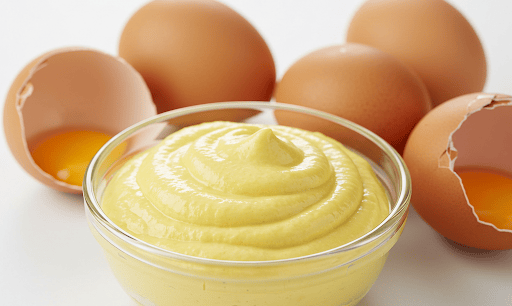German Startup Disrupting the Vegan Foods With Egg Subsitutes
SUSTAINABILITYALTERNATIVE PROTEINS


This is an AI generated illustration and does not represent actual product or service.
Eggs are a culinary staple worldwide, valued for their nutritional richness and versatility. However, the demand for plant-based alternatives is on the rise, fueled by concerns about animal welfare, sustainability, and dietary preferences. Despite numerous attempts to replicate the taste, texture, and functionality of chicken eggs using plant-based ingredients, achieving a fully satisfying substitute has proven challenging—especially for culinary applications like frying.
German startup Lovely Day Foods filed a patent application on a new plant-based egg substitute designed to bridge this gap. Their innovation addresses not only the nutritional and culinary challenges but also aims to replicate the experience of fried eggs with a vegan alternative.
Composition of the Vegan Egg Substitute
The patented formula comprises a carefully balanced combination of plant-based ingredients, ensuring the product mimics the structure, taste, and frying properties of chicken eggs. The key components include:
Pea Protein Isolate (8–16%): Serves as the primary source of protein and contributes to texture.
Vegetable Oil (8–16%): Provides fat content, essential for a smooth mouthfeel and gelling properties.
Thickening Agents (0.5–2%): Ensures the desired viscosity and texture during frying.
Emulsifiers (0.1–1%): Helps maintain a stable mixture of oil and water.
Acidity Regulators (0.01–1%): Maintains a pH level of 5.0–7.0, essential for stability and texture.
Organic Acids: Enhances flavor and contributes to the product's shelf life.
Water: Acts as the primary carrier for the other ingredients.
The composition can also include colorants (such as carotenoids for a yellow hue) and flavoring agents (like kala namak, a sulfurous salt that imparts an egg-like flavor). Additionally, faba bean protein isolate may be incorporated to enhance the gelling and mouthfeel properties further.
Key Innovations
The standout features of Lovely Day Foods' egg substitute include:
Frying Capability: The substitute replicates the structure and texture of fried eggs, addressing a major gap in current plant-based alternatives.
Optimal Gelling Properties: The inclusion of specific protein isolates and salt concentrations ensures the substitute gels and sets like a natural egg when cooked.
Natural Additives for Taste and Color: Ingredients like kala namak provide an authentic egg flavor, while carotenoids contribute to its realistic appearance.
Shelf Stability: The product achieves extended shelf life through natural preservatives like nisin and sorbic acid.
Their patent application outlines a step-by-step method for creating the egg substitute. The process includes dissolving acidity regulators, thickeners, and protein isolates in water, followed by the incorporation of vegetable oil, emulsifiers, and organic acids. The mixture is then heated to 70–75°C and cooled to the desired temperature, resulting in a product with optimal texture and pH.
Culinary and Industry Implications
This plant-based egg substitute offers several benefits for both consumers and food manufacturers:
Versatility: Suitable for frying, baking, and cooking, it functions like a traditional egg in various recipes.
Sustainability: Reduces reliance on animal agriculture, lowering the environmental footprint associated with egg production.
Dietary Inclusion: Provides a viable option for vegans, vegetarians, and those with egg allergies.
Health Benefits: Free of cholesterol and animal-based fats, aligning with health-conscious dietary trends.
By combining scientific precision with culinary considerations, the startup has developed a product that not only replicates the taste and texture of fried eggs but also meets the growing demand for sustainable and ethical food alternatives. The company currently offers this product under Perfeggt brand name and was named #20 out of 50 most popular startup brands in Germany according to a survey conducted by Jung von Matt with 48.000 participants.
